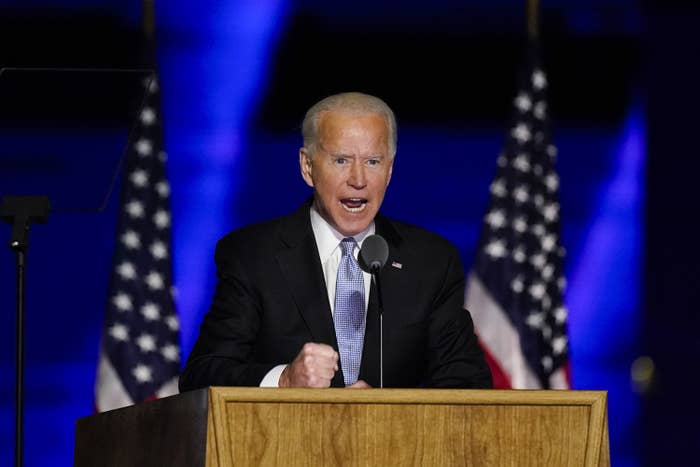
President-elect Joe Biden wants Americans to “give each other a chance.”
After years of relentless division — and, in President Donald Trump’s case, an outright targeting of people of color and his political rivals — Biden used his first major national address as president-elect to pitch Americans on a vastly different vision: Step away from bitter resentments and partisanship. And at the same time, work to correct systemic racism and inequities.
“To those who voted for President Trump, I understand your disappointment tonight. I’ve lost a couple of elections myself,” said the former vice president, whose previous two races for the office he’s just won failed. “But now, let’s give each other a chance.”
“It’s time to put away the harsh rhetoric. To lower the temperature. To see each other again. To listen to each other again. To make progress, we must stop treating our opponents as our enemy. We are not enemies. We are Americans.”
Biden’s address on Saturday night came hours after news networks called the race for him at around 11:30 a.m., when he overtook Trump in Pennsylvania by a margin of votes that would not trigger an automatic recount. He delivered his address at the Chase Center in Wilmington, Delaware, after Vice President–elect Kamala Harris, the first Black, South Asian woman to be elected to the office, delivered a poignant speech about breaking barriers and the power of immigrants — who Trump didn’t just demonize, but actually persecuted with various policies.
Though Biden only once directly mentioned Trump — who has not conceded the race despite the results — he spent much of the address seeking to calm the chaos the US has experienced in the past four years. Trump routinely drove wedges into cultural and political issues to divide the nation, and then would revel in the fallout as his conservative base got riled up about race, politics, gender, immigration status, and just basic tastes.
Biden, knowing this, threw back to one of the most recognizable phrases from Barack Obama, who earned two convincing victories at the polls on a message of hope.
"I'm humbled by the trust and confidence you've placed in me. I pledge to be a president who seeks not to divide but unify. Who doesn't see red states and blue states. Only sees the United States," Biden said.
“This is a great nation,” he said. “And we’re a good people.”
Biden laid out his central logic for unity, perhaps previewing how he will deal with a Senate that will likely remain under Republican control: that the left and the right aren’t currently such bitter rivals by their inherent nature but by their intent.
“The refusal of Democrats and Republicans to cooperate with one another is not due to some mysterious force beyond our control,” Biden said. “It’s a decision. It’s a choice we make.
“And if we can decide not to cooperate, then we can decide to cooperate. And I believe that this is part of the mandate from the American people,” he said.
This, also, was the Obama path, and it provides a warning. The 44th president tried to achieve his legislative goals by reaching out to Republicans who controlled the House and Senate and brokering deals, with Biden often serving as a negotiator. But by that point, the GOP had shifted further to the right. It barely worked.
“I ran as a proud Democrat. I will now be an American president. I will work as hard for those who didn’t vote for me — as those who did,” Biden said.
“Let this grim era of demonization in America begin to end — here and now.”
The president-elect also specifically acknowledged Black voters. They saved his primary campaign when they turned out in force for him in South Carolina. Then they helped him secure the presidency by showing up in states like Georgia, Michigan, Wisconsin, and Pennsylvania.
“The African American community stood up again for me,” Biden said. “They always have my back, and I’ll have yours.”
And he directly addressed many other Americans whose communities have either been dismissed or openly attacked by Trump: “Progressives, moderates, and conservatives. Young and old. Urban, suburban, and rural. Gay, straight, transgender. White. Latino. Asian. Native American,” Biden said. “I said from the outset I wanted a campaign that represented America, and I think we did that. Now that’s what I want the administration to look like.”
In contrast to Trump, Biden acknowledged the reality of the staggering toll COVID-19 has taken on America, and the challenges ahead to deal with the pandemic. He said he plans to form a group of pandemic-focused transition advisers, including scientists and public health experts, to “take the Biden–Harris COVID plan and convert it into an action blueprint that starts on Jan. 20, 2021.”
As he has done several times in the months leading up to his victory, Biden spoke to the grief that many Americans have suffered as a result of the more than 237,000 deaths the virus has caused, reading a hymn, "On Eagle's Wings," that was a favorite of his son Beau, who died of cancer in 2015.
“I hope it can provide some comfort and solace to the more than 230,000 families who have lost a loved one to this terrible virus this year,” he said. My heart goes out to each and every one of you. Hopefully this hymn gives you solace.”
